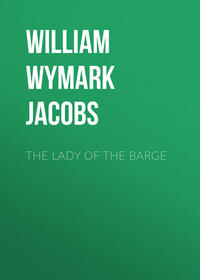 полная версия
полная версияA Master Of Craft
“I never did,” said the fisherman. “What are we a-coming to?”
The mate did not stay to inform him. He walked hastily to the quartette and, bursting with rage, asked Jones what he meant by it.
“Mean by wot, sir?” asked Jones, in surprise.
“Top-hats,” said the mate, choking.
The four turned and regarded him stolidly, keeping as close together as possible for the sake of moral support and the safety of their head-gear.
“For the weddin’, sir,” said Jones, as though that explained everything.
“You take ‘em off,” said the mate, sharply. “I won’t let you wear ‘em.”
“I beg your pardin,” said Jones, with great politeness, “we got these ‘ere ‘ats for the weddin’, an’ we’re a-goin’ to wear ‘em.”
He took the offending article off and brushed it tenderly with his coat-sleeve, while the furious mate looked assault and battery at the other three. Tim, whose hat came well down over his eyes, felt comparatively safe; but the cook, conscious that his perched lightly on the top of his head, drew back a pace. Then he uttered an exclamation as Captain Nibletts, who was officiating as best man, came hurriedly down the cliff.
“Hats?” said the little skipper, disengaging himself from the mate’s grasp, as he came on board. “Yes, I don’t mind.”
“Wot about Capt’in Barber?” demanded the mate, impressively.
“If they was pudding-basins ‘e wouldn’t mind,” said Nibletts, testily; “he’s that nervous ‘e don’t know what ‘e’s doing hardly. He was raving like a madman for five minutes cos ‘e couldn’t fasten his collar, and then I found he’d forgot to put his shirt on. He don’t care.”
He hurried down to the cabin and then came bustling up again. His small face was strained with worry, and the crew eyed him respectfully as he came forward and dealt out white satin favours.
“Cap’in Barber’ll be all right with you looking arter ‘im, sir,” said Jones, with strong conviction.
“That he will,” said the cook, nodding.
“There’s some whisky in a bottle in my locker, cook,” said Nibletts, dancing about nervously; “give the hands one drink each, cook. Only one, mind.”
The men thanked him, and with kindly eyes watched him go ashore. The cook went down for the whisky, and Tim, diving into the forecastle, brought up four mugs.
“He must ha’ meant another bottle,” said Jones, as the cook came slowly up again with a bottle containing one dose.
“There ain’t another,” said the cook; “he’s ‘alf off ‘is ‘ed.”
There was a pained silence. “We must toss for it,” said Jones, at length; “that is, unless you chaps don’t want it.”
“Toss,” said three voices speaking as one.
Jones sighed, and the coins were produced. The prize fell to Tim, and he leaned against the windlass and slowly poured the yellow liquid into his mug.
“There’s more than I thought there was,” remarked Mr. Jones, in surprise.
“Bottles is deceiving,” said the cook.
“It ain’t the fust toss as Tim ‘as won,” said the third man, darkly.
The ordinary seaman made no reply, but, stepping over to the water-cask, added with great care a little water.
“Here’s your ‘ealth, chaps,” he said, good-naturedly, as he drank, “and may you never want a drink.”
“You’ve never drunk all that, Tim?” said Mr. Jones, anxiously.
Tim shook his head. “There’s too much to drink all at once,” he said, gravely, and sat, with the mug on his knee, gazing ashore. “It’s warming me all over,” he mused. “I never tasted sich whisky afore. I’m in a gentle glow.”
So was the cook; a glow which increased to fever heat as the youth raised the mug to his lips again, and slowly drained it and handed it to him to wash up.
A little later the men went ashore, and strolling aimlessly up and down the road, passed the time in waiting for the ceremony and making sudden dashes after small boys who were throwing at their hats and hitting their heads.
Seabridge itself was quiet, but Mrs. Banks’ house was in a state of ferment. Ladies with pins in their mouths wandered about restlessly until, coming into the orbit of one of the brides, they stuck one or two into her and then drew back to behold the effect. Miss Banks, in white satin, moved about stiffly; Mrs. Church, in heliotrope, glanced restlessly up the road every time she got near the window.
“Now you sit down,” said one lady, at length, “both of you. All you’ve got to do now is to wait for the gentlemen.”
It was whispered that Mr. Gibson’s delay was due to the fact that he had gone up for Captain Barber, and as time passed a certain restlessness became apparent in the assembly, and sympathetic glances were thrown in the direction of Mrs. Church. Places at the window were at a premium, and several guests went as far as the garden gate and looked up the road. Still no Captain Barber.
“It’s time they were here,” said Mrs. Banks at last, in a stern voice.
There was a flutter at the gate, and a pretty girl heliographed with her eyes that the parties of the other part were in sight. A minute or two later they came into sight of the window. Captain Barber, clad in beautiful raiment, headed the cortège, the rear of which was brought up by the crew of the Foam and a cloud of light skirmishers which hovered on their flanks. As they drew near, it was noticed that Captain Barber’s face was very pale, and his hands trembled, but he entered the house with a firm step and required no assistance.
Of his reception there was never for a moment any doubt. Young matrons smiled and shook their heads at him, middle-aged matrons took him by the hand, while old ladies committed themselves to the statement that they had seen matrimony in his eye for years. He received the full measure accorded to a very distinguished convert, and, taking a chair placed against the wall, surveyed the company with the air of a small boy who has strayed into a hostile alley. A little natural curiosity found vent.
“Now, what first put it into your head to get married?” ask one fair enquirer.
“Mrs. Church,” said the ex-mariner, simply.
“Yes, of course,” said the matron; “but was it love at first sight, or did it grow on you before you knew it?”
Captain Barber blushed. “It growed on me afore I knew it,” he replied, fervently.
“I suppose,” said a lady of a romantic turn of mind, “that you didn’t know what was happening at first?”
“I did not, ma’am,” agreed the Captain, in trembling tones. “Nobody was more surprised than wot I was.”
“How strange,” said two or three voices.
They regarded him tenderly, and the youngest bridesmaid, a terrible child of ten, climbed up on his knee and made audible comparisons between the two bridegrooms, which made Mr. Gibson smile.
“Time we started,” said Mrs. Banks, raising her voice above the din. “Cap’in Barber, you and Mr. Gibson and the other gentlemen had better get to the church.”
The men got up obediently, and in solemn silence formed up in the little passage, and then started for the church some two hundred yards distant, the crew of the Foam falling in behind unchallenged.
To this day Captain Barber does not know how he got there, and he resolutely declines to accept Captain Niblett’s version as the mere offspring of a disordered imagination. He also denies the truth of a statement circulated in the town that night that, instead of replying to a leading question in the manner plainly laid down in the Church Service, he answered, “I suppose so.”
He came out of the church with a buzzing in his ears and a mist before his eyes. Something was clinging to his arm, which he tried several times to shake off. Then he discovered that it was Mrs. Barber.
Of the doings of the crew of the Foam that night it were better not to speak. Suffice it to say that when they at length boarded their ship Tim was the only one who still possessed a hat, and in a fit of pride at the circumstance, coupled, perhaps, with other reasons, went to bed in it. He slept but ill, however, and at 4 A. M., the tide being then just on the ebb, the only silk hat in the forecastle went bobbing up and down on its way to the sea.
CHAPTER XXII
A FINE October gave way to a damp and dreary November; a month of mists and fogs, in which shipping of all sizes and all nations played blind man’s buff at sea, and felt their way, mere voices crying in the wilderness, up and down the river. The Swallow, with a soul too large for its body, cannoned a first-class battleship off the Medway, and with a thoughtfulness too often lacking at sea, stood by and lowered a boat, whereupon the captain, who had been worrying about his paint, invented, in his surprise, a brand-new adjective for the use of senior officers of the British Navy.
Over three months had elapsed since the Golden Cloud set out on her long voyage; three months during which Fraser, despite his better sense, had been a constant visitor of Poppy Tyrell’s, and had assisted her in the search for fresh lodgings to avoid the attentions of Mr. Bob Wheeler, who, having discovered her whereabouts, had chosen to renew his suit.
On two or three occasions the girl had accompanied him on board the steamer, and at such times it was Mr. Green’s pleasure to wink in a frenzied manner at Mr. Joe Smith and to make divers bets of pints of beer, which made that thirsty soul half crazy to listen to. He also said that any one with half an eye could see what was in the wind.
“And a very nice couple they’ll make, too,” said Joe, solemnly.
“An’ what about Cap’in Flower?” suggested Mr. Green; “she’s evident the young lady he was talking about that night, and Tommy’s heard ‘em speaking about him once or twice, too.”
Joe shuffled uneasily. He was beginning to entertain a considerable regard for his new skipper, dating from the time he discovered that his sinister suspicions concerning him were unfounded. He had moreover conceived a dog-like admiration for Poppy Tyrell.
“That’s ‘is business,” he said, shortly; “judging by what you ‘eard in that pub, Cap’in Flower knows where to put ‘is hand on one or two more if ‘e wants ‘em.”
He walked off in dudgeon, ignoring a question by Mr. Green as to whose foot kep’ the door open, and felt dimly the force of the diction that no man can serve two masters; and, with a view to saving himself worry, dismissed the matter from his mind until some weeks afterwards it was forcibly revived by the perusal of a newspaper which the engineer had brought on board. Without giving himself time for due reflection, he ran up on deck and approached the skipper.
“Golden Cloud’s in the paper as overdue, sir,” he said, respectfully.
“What is?” enquired Fraser, sharply.
“Golden Cloud, sir; boat Cap’in Flower is on,” said Joe, slowly.
Fraser regarded him sternly. “What do you know about it?” he asked.
Joe looked round helplessly. At such moments Willyum Green was a tower of strength, but at the present time he was fooling about helping the ship’s cat to wash itself.
“What do you know about it?” repeated Fraser.
“Will-yum told me, sir,” said Joe, hastily.
Mr. Green being summoned, hastily put down the cat and came aft, while Joe, with a full confidence in his friend’s powers, edged a few feet away, and listened expectantly as the skipper interrogated him.
“Yes, sir, I did tell Joe, sir,” he answered, with a reproachful glance at that amateur. “I met Cap’in Flower that evening again, late, an’ he told me himself. I’m sorry to see by this morning’s paper that his ship is overdue.”
“That’ll do,” said Fraser, turning away.
The men moved off slowly, Mr. Green’s reproaches being forestalled by the evidently genuine compliments of Joe.
“If I’d got a ‘ead like you, Will-yum,” he said, enviously, “I’d be a loryer or a serlicitor, or some-think o’ the kind.”
Days passed and ran into weeks, but the Golden Cloud was still unspoken. Fraser got a paper every day when ashore, but in vain, until at length one morning, at Bittlesea, in the news columns of the Daily Telegraph, the name of the missing ship caught his eye. He folded the paper hurriedly, and breathed hard as he read:—
“Missing ship, Golden Cloud.
“Rio Janeiro, Thursday.
“The barque Foxglove, from Melbourne to Rio Janeiro, has just arrived with five men, sole survivors of the ship Golden Cloud, which they report as sunk in collision with a steamer, name unknown, ten weeks out from London. Their names are Smith, Larsen, Petersen, Collins and Gooch. No others saved.”
In a dazed fashion he read the paragraph over and over again, closely scanning the names of the rescued men. Then he went up on deck, and beckoning to Joe, pointed with a trembling finger to the fatal paragraph. Joe read it slowly.
“And Cap’in Flower wasn’t one o’ them, sir?” he asked, pointing to the names.
Fraser shook his head, and both men stood for some time in silence.
“He’s done it this time, and no mistake,” said Joe, at last. “Well, ‘e was a good sailorman and a kind master.”
He handed the paper back, and returned to his work and to confer in a low voice with Green, who had been watching them. Fraser went back to the cabin, and after sitting for some time in a brown study, wrote off to Poppy Tyrell and enclosed the cutting.
He saw her three days later, and was dismayed and surprised to find her taxing herself with being the cause of the adventurous mariner’s death.
“He would never have heard of the Golden Cloud if it hadn’t been for me,” she said, trembling. “His death is at my door.”
Fraser tried to comfort her and straining metaphor to the utmost, said that if the finger of Providence had not made her oversleep herself she would undoubtedly have shared the same fate.
The girl shook her head.
“He shipped before the mast for the sake of being on the same ship as I was,” she said, with quivering lip; “it is not every man who would have done that, and I—I—”
“Overslept yourself,” said Fraser, consolingly.
Miss Tyrell made an impatient gesture, but listened hopefully as her visitor suggested that it was quite possible Flower had got away in another boat.
“I’ll watch the paper every day,” she said, brightening; “you miss some at sea.”
But nothing came of the watching. The Golden Cloud had had its obituary in the paper in large type, and that was all—a notice to certain women and children scattered about Europe to go into mourning and to the owners to get another ship.
By the end of the couple of months Fraser had given up all hope. He was very sorry for his unfortunate friend, but his sorrow was at times almost tempered by envy as he pondered over the unexpected change which had come over his relations with Poppy Tyrell. The old friendly footing had disappeared, and her manner had become distant as though, now that the only link which connected them was broken, there was no need for further intercourse. The stiffness which ensued made his visits more and more difficult. At last he missed calling one night when he was in London, and the next time he called the girl was out. It was a fortnight before he saw her, and the meeting was embarrassing to both.
“I’m sorry I was out last time you came,” said Poppy.
“It didn’t matter,” said Fraser.
Conversation came to a standstill. Miss Tyrell, with her toes on the fender, gazed in a contemplative fashion at the fire. “I didn’t know–” began Fraser, who was still standing.
He cleared his voice and began again. “I didn’t know whether you would rather I left off coming,” he said, slowly.
Her gaze travelled slowly from the fire to his face. “You must please yourself,” she said, quietly.
“I would rather please you,” he said, steadily.
The girl regarded him gravely. “It is rather inconvenient for you sometimes,” she suggested, “and I am afraid that I am not very good company.”
Fraser shook his head eagerly. “It is not that at all,” he said hastily.
Poppy made no reply, and there was another long silence. Then Fraser advanced and held out his hand.
“Good-bye,” he said, quietly.
“Good-bye,” said the girl. She smiled brightly, and got up to see him downstairs.
“I wanted to say something before I went,” said Fraser, slowly, as he paused at the street-door, “and I will say it.”
Miss Tyrell, raising her eyebrows somewhat at his vehemence, waited patiently.
“I have loved you from the moment I saw you,” said Fraser, “and I shall go on loving you till I die. Good-bye.”
He pressed her hand again, and walked down the little front garden into the street. At the gate he paused and looked round at Poppy still standing in the lighted doorway; he looked round again a few yards down the street, and again farther on. The girl still stood there; in the momentary glimpse he had of her he fancied that her arm moved. He came back hastily, and Miss Tyrell regarded him with unmistakable surprise.
“I thought—you beckoned me,” he stammered.
“Thought I beckoned you?” repeated the girl.
“I thought so,” murmured Fraser. “I beg your pardon,” and turned confusedly to go again.
“So—I—did,” said a low voice.
Fraser turned suddenly and faced her; then, as the girl lowered her eyes before his, he re-entered the house, and closing the door led her gently upstairs.
“I didn’t like you to go like that,” said Miss Tyrell, in explanation, as they entered her room.
Fraser regarded her steadfastly and her eyes smiled at him. He drew her towards him and kissed her, and Miss Tyrell, trembling with something which might have been indignation, hid her face on his shoulder.
For a long time, unless certain foolish ejaculations of Fraser’s might count as conversation, they stood silent; then Poppy, extricating herself from his arm, drew back and regarded him seriously.
“It is not right,” she said, slowly; “you forget.”
“It is quite right,” said Fraser; “it is as right as anything can be.”
Poppy shook her head. “It has been wrong all along,” she said, soberly, “and Captain Flower is dead in consequence. I never intended to go on the Golden Cloud, but I let him go. And now he’s dead. He only went to be near me, and while he was drowning I was going out with you. I have been very wicked.”
Fraser protested, and, taking her hand, drew her gently towards him again.
“He was very good to my father,” said Poppy, struggling faintly. “I don’t think I can.”
“You must,” said Fraser, doggedly; “I’m not going to lose you now. It is no good looking at me like that. It is too late.”
He kissed her again, secretly astonished at his own audacity, and the high-handed way in which he was conducting things. Mixed with his joy was a half-pang, as he realised that he had lost his fear of Poppy Tyrell.
“I promised my father,” said the girl, presently. “I did not want to get married, but I did not mind so much Until—”
“Until,” Fraser reminded her, fondly.
“Until it began to get near,” said the girl; “then I knew.”
She took her chair by the fire again, and Fraser, placing his beside it, they sat hand in hand discussing the future. It was a comprehensive future, and even included Captain Flower.
“If he should be alive, after all,” said Poppy, with unmistakable firmness, “I shall still marry him if he wishes it.”
Fraser assented. “If he should ever turn up again,” he said, deliberately, “I will tell him all about it. But it was his own desire that I should watch over you if anything happened to him, so he is as much to blame as I am. If he had lived I should never have said a word to you. You know that.”
“I know,” said Poppy, softly.
Her hand trembled in his, and his grasp tightened as though nothing should loosen it; but some thousands of miles away Captain Flower, from the deck of a whaler, was anxiously scanning the horizon in search of the sail which was to convey him back to England.
CHAPTER XXIII
Time as it rolled on set at rest any doubts Miss Tyrell might have had concerning the fate of Captain Flower, and under considerable pressure from Fraser, she had consented to marry him in June. The only real reason for choosing that month was, that it was close at hand, though Fraser supplied her with several others to choose from. Their engagement could hardly have been said to have been announced, for with the exception of old Mr. Fraser and the crew of the Swallow, who had gleaned the fact for themselves without any undue strain on their intellects, there was nobody to tell.
The boy was the first to discover it. According to his own indignant account, he went down to the cabin to see whether there was anything he could do, and was promptly provided with three weeks’ hard labour by his indignant skipper. A little dissertation in which he indulged in the forecastle on division of labour met with but scant response; Joe said that work was good for boys, and Mr. Green said that he knew a boy who worked eighteen hours a day, and then used to do sums in his sleep to improve his education. The other men set their wits to work then, and proved to have so large an acquaintance with a type of boy that Tommy loathed, that he received a mild chastisement for impertinence to his elders and betters.
It wanted but two days to the wedding. The Swallow was lying in the river, her deck unoccupied except for Mr. Green and the boy, who were smoking in the bows, and the ship’s cat, which, with one eye on Mr. Green, was stalking the frying-pan. Fraser had gone ashore on business connected with his wedding-garments, and Poppy Tyrell, with all her earthly belongings in a couple of boxes, sat in the cabin dreaming of her future.
A boat bumped against the side of the steamer, and Mr. Green, looking round, observed the long form of Joe scrambling over the side. His appearance betokened alarm and haste, and Mr. Green, after a brief remark on the extravagance, not to say lordliness, of a waterman’s skiff when a hail would have taken the ship’s boat to him, demanded to know what was the matter.
“Send that boy below,” said Joe, hastily.
“What for?” enquired the gentleman interested, rebelliously.
“You go below,” repeated Joe, sternly, “‘fore I take you by the scruff o’ your little neck and drop you down.”
The boy, with a few remarks about the rights of man in general and ships’ boys in particular, took his departure, and Joe, taking the startled Mr. Green by the arm, led him farther aft.
“You’ve got a ‘ead on you Will-yum, I know,” he said, in a fierce whisper.
“People have said so,” remarked the other, modestly. “What’s the row?”
For answer, Joe pointed to the cabin, and that with so much expression on his features that Mr. Green, following his gaze, half expected to see something horrible emerge from the companion.
“It’s all up,” said the tall seaman, poetically. “You can put the wedding-dress away in brown paper, and tell the church bells as there is no call for ‘em to ring: Cap’n Flower has turned up ag’in.”
“WHAT?” cried the astonished Mr. Green.
“I see ‘im,” replied Joe. “I was just goin’ on the wharf as I passed to speak to old George, when I see ‘im talking to ‘im. He didn’t see me, an’ I come off ‘ere as fast as my legs could carry me. Now, wot’s to be done? You’ve got the ‘ead-piece.”
Mr. Green scratched the article in question and smiled feebly.
“On’y two days, and they would ha’ been married,” said Joe; “bit ‘ard, ain’t it? I’m glad as I can be as he’s safe, but he might ha’ waited a day or two longer.”
“Did George seem scared?” enquired his friend.
“Wot’s that got to do with it?” demanded Joe, violently. “Are you goin’ to set that ‘ead-piece to work or are you not?”
Mr. Green coughed confusedly, and attempted to think with a brain which was already giddy with responsibility.
“I don’t want to do anything that isn’t straight and gentlemanly,” he remarked.
“Straight?” repeated Joe. “Look ‘ere! Cap’n Fraser’s our old man, ain’t he? Very good, it’s our dooty to stand by ‘im. But, besides that, it’s for the young lady’s sake: it’s easy to see that she’s as fond of him as she can be, and she’s that sort o’ young lady that if she come up now and told me to jump overboard, I’d do it.”
“You could swim ashore easy,” asserted Mr. Green.
“They was to be married Thursday morning,” continued Joe, “and now here’s Cap’n Flower and no ‘ead-piece on the ship. Crool, I call it.”
“She’s a very nice young lady,” said the mortified Mr. Green; “always a pleasant smile for everybody.”
“He’ll come aboard ‘ere as safe as heggs is heggs,” said Joe, despondently. “Wot’s to be done?”









